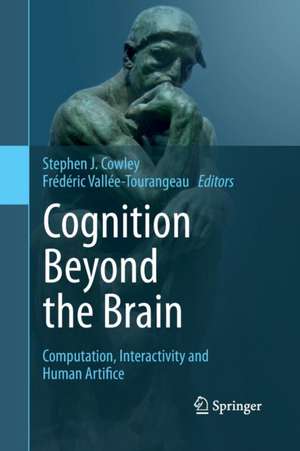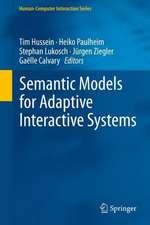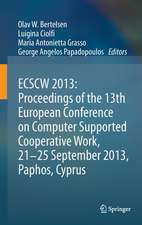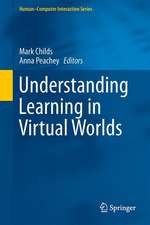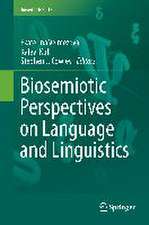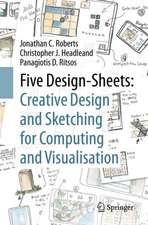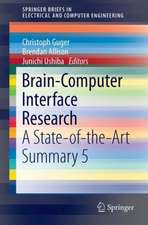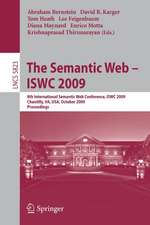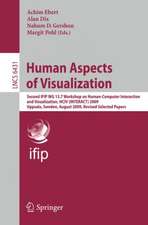Cognition Beyond the Brain: Computation, Interactivity and Human Artifice
Editat de Stephen J. Cowley, Frédéric Vallée-Tourangeauen Limba Engleză Paperback – 14 iul 2015
Illustrating distributed cognition, one set of chapters focus on computer mediated trust, work at a construction site, judgement aggregation and crime scene investigation. Turning to how bodies manufacture skills, the remaining chapters focus on interactivity or sense-saturated coordination. The feeling of doing is crucial to solving maths problems, learning about X rays, finding an invoice number, or launching a warhead in a film. People both participate in extended systems and exert individual responsibility. Brains manufacture a now to which selves are anchored: people can act automatically or, at times, vary habits and choose to author actions. In ontogenesis, a systemic view permits rationality to be seen as gaining mastery over world-side resources. Much evidence and argument thus speaks for reconnecting the study of computation, interactivity and human artifice. Taken together, this can drive a networks revolution that gives due cognitive importance to the perceivable world that lies beyond the brain.
Cognition Beyond the Brain is a valuable reference for researchers, practitioners and graduate students within the fields of Computer Science, Psychology, Linguistics and Cognitive Science.
| Toate formatele și edițiile | Preț | Express |
|---|---|---|
| Paperback (2) | 645.79 lei 6-8 săpt. | |
| SPRINGER LONDON – 14 iul 2015 | 645.79 lei 6-8 săpt. | |
| Springer International Publishing – 20 iul 2018 | 768.93 lei 38-44 zile | |
| Hardback (2) | 652.07 lei 6-8 săpt. | |
| SPRINGER LONDON – 28 iun 2013 | 652.07 lei 6-8 săpt. | |
| Springer International Publishing – 5 apr 2017 | 788.95 lei 38-44 zile |
Preț: 645.79 lei
Preț vechi: 807.24 lei
-20% Nou
Puncte Express: 969
Preț estimativ în valută:
123.59€ • 128.55$ • 102.03£
123.59€ • 128.55$ • 102.03£
Carte tipărită la comandă
Livrare economică 14-28 aprilie
Preluare comenzi: 021 569.72.76
Specificații
ISBN-13: 9781447161646
ISBN-10: 1447161645
Pagini: 300
Ilustrații: VIII, 292 p.
Dimensiuni: 155 x 235 x 16 mm
Greutate: 0.43 kg
Ediția:2013
Editura: SPRINGER LONDON
Colecția Springer
Locul publicării:London, United Kingdom
ISBN-10: 1447161645
Pagini: 300
Ilustrații: VIII, 292 p.
Dimensiuni: 155 x 235 x 16 mm
Greutate: 0.43 kg
Ediția:2013
Editura: SPRINGER LONDON
Colecția Springer
Locul publicării:London, United Kingdom
Public țintă
ResearchCuprins
Human Thinking beyond the Brain.- Human Agency and the Resources of Reason.- Judgement Aggregation and Distributed Thinking.- Computer-Mediated Trust in Self-Interested Expert Recommendations.- Living as Languaging: Distributed Knowledge in Living Beings.- The Quick and the Dead: On Temporality and Human Agency.- You Want a Piece of Me? Paying Your Dues and Getting Your Due in a Distributed World.- Distributed Cognition at the Crime Scene.- Socially Distributed Cognition in Loosely Coupled Systems.- Thinking with External Representations.- Human Interactivity: Problem-solving, Solution-probing and Verbal Patterns in the Wild.- Interactivity and Embodied Cues in Problem Solving, Learning and Insight: Further Contributions to a “Theory of Hints”.- Naturalising Problem Solving.- Systemic Cognition: Human Artifice in Life and Language.- Index.
Recenzii
“Cognition Beyond the Brain: Computation,Interactivity, and Human Artifice, a collection of 14 essays, is a finerepresentation of the current state of the field in distributed cognition—notonly for empirical developments but also for disagreements about how to thinkabout distributed cognition. … I highly recommend this collection of essays tophilosophers and psychologists interested in where distributed cognition is,what it could be, and how it can get from one to the other.” (Charles Lassiter,Philosophical Psychology, Vol. 28 (8), 2015)
“Cognition Beyond the Brain is a collection of works that had its beginnings in a 2009 symposium on ‘distributed thinking’ … building upon presentations from this meeting and incorporating later contributions on the subject. … this book is an excellent reference on the topic. … the chapters of this book do a good job of reflecting the diversity of opinion in this area. … In summary, the book is a valuable resource as an overview on distributed cognition.” (Emma Norling, Journal of Artificial Societies and Social Simulation, Vol. 17 (1), 2014)
“It offers a wide range of perspectives on the interaction and interdependencies between the human brain and the environment and context in which it exists. It offers an excellent entry point for readers interested in cognitive studies of thebrain … . Overall, we found the book enjoyable to read, and appreciated the editors’ efforts in assembling a well-balanced set of contributions. It provides insight on how cognition may work, and what influences cognition.” (Franz Kurfess and Kevin Dermody, Computing Reviews, December, 2013)
“Cognition Beyond the Brain is a collection of works that had its beginnings in a 2009 symposium on ‘distributed thinking’ … building upon presentations from this meeting and incorporating later contributions on the subject. … this book is an excellent reference on the topic. … the chapters of this book do a good job of reflecting the diversity of opinion in this area. … In summary, the book is a valuable resource as an overview on distributed cognition.” (Emma Norling, Journal of Artificial Societies and Social Simulation, Vol. 17 (1), 2014)
“It offers a wide range of perspectives on the interaction and interdependencies between the human brain and the environment and context in which it exists. It offers an excellent entry point for readers interested in cognitive studies of thebrain … . Overall, we found the book enjoyable to read, and appreciated the editors’ efforts in assembling a well-balanced set of contributions. It provides insight on how cognition may work, and what influences cognition.” (Franz Kurfess and Kevin Dermody, Computing Reviews, December, 2013)
Textul de pe ultima copertă
Cognition Beyond the Brain challenges neurocentrism by advocating a systemic view of cognition based on investigating how action shapes the experience of thinking. The systemic view steers between extended functionalism and enactivism by stressing how living beings connect bodies, technologies, language and culture. Since human thinking depends on a cultural ecology, people connect biologically-based powers with extended systems and, by so doing, they constitute cognitive systems that reach across the skin. Biological interpretation exploits extended functional systems.
Illustrating distributed cognition, one set of chapters focus on computer mediated trust, work at a construction site, judgement aggregation and crime scene investigation. Turning to how bodies manufacture skills, the remaining chapters focus on interactivity or sense-saturated coordination. The feeling of doing is crucial to solving maths problems, learning about X rays, finding an invoice number, or launching a warhead in a film. People both participate in extended systems and exert individual responsibility. Brains manufacture a now to which selves are anchored: people can act automatically or, at times, vary habits and choose to author actions. In ontogenesis, a systemic view permits rationality to be seen as gaining mastery over world-side resources. Much evidence and argument thus speaks for reconnecting the study of computation, interactivity and human artifice. Taken together, this can drive a networks revolution that gives due cognitive importance to the perceivable world that lies beyond the brain.
Cognition Beyond the Brain is a valuable reference for researchers, practitioners and graduate students within the fields of Computer Science, Psychology, Linguistics and Cognitive Science.
Illustrating distributed cognition, one set of chapters focus on computer mediated trust, work at a construction site, judgement aggregation and crime scene investigation. Turning to how bodies manufacture skills, the remaining chapters focus on interactivity or sense-saturated coordination. The feeling of doing is crucial to solving maths problems, learning about X rays, finding an invoice number, or launching a warhead in a film. People both participate in extended systems and exert individual responsibility. Brains manufacture a now to which selves are anchored: people can act automatically or, at times, vary habits and choose to author actions. In ontogenesis, a systemic view permits rationality to be seen as gaining mastery over world-side resources. Much evidence and argument thus speaks for reconnecting the study of computation, interactivity and human artifice. Taken together, this can drive a networks revolution that gives due cognitive importance to the perceivable world that lies beyond the brain.
Cognition Beyond the Brain is a valuable reference for researchers, practitioners and graduate students within the fields of Computer Science, Psychology, Linguistics and Cognitive Science.
Caracteristici
Introduces a novel systemic perspective on cognition based on multidisciplinary empirical work Explores the role of human agency in cognitive systems Extends the computational basis of distributed cognition into molecular systems
Notă biografică
Stephen J.Cowley is Professor of Organisational Cognition at the University of Southern Denmark. He has developed ways of integrating the study of language, cognition and the sociocultural world and in 2012 he took up his current position in Denmark where he is concerned with how organisations rely on cognitive resources beyond the body. He founded the Distributed Language Group, a community who aims to naturalise language by focusing on how directed, dialogical activity imbues human intelligence with a collective dimension that also makes literacy possible.
Frédéric Vallée-Tourangeau is Professor of Psychology and Director of Postgraduate Research at Kingston University, UK. He holds a BA from McGill University, an MA from the University of Pennsylvania, and a PhD from McGill University. His most recent research explores the role of interactivity in the genesis of insight.
Frédéric Vallée-Tourangeau is Professor of Psychology and Director of Postgraduate Research at Kingston University, UK. He holds a BA from McGill University, an MA from the University of Pennsylvania, and a PhD from McGill University. His most recent research explores the role of interactivity in the genesis of insight.
